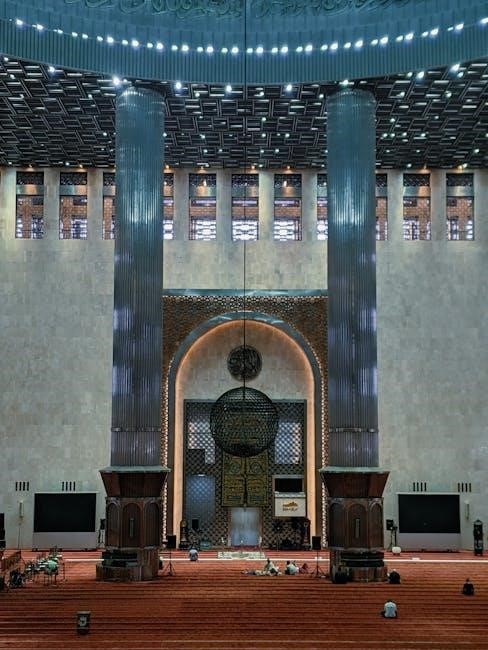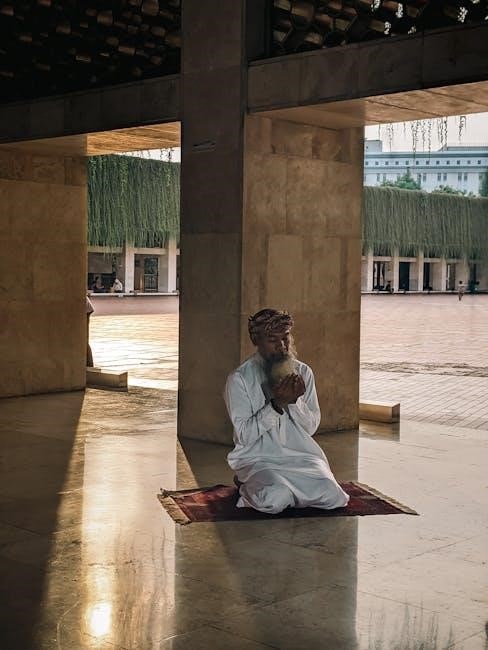Dua after prayer is a sacred Islamic practice, offering a direct link to Allah. It involves expressing gratitude, seeking forgiveness, and requesting blessings, deeply rooted in Islamic tradition and recommended immediately after obligatory prayers. This heartfelt supplication fosters spiritual growth, humility, and a stronger connection with the Divine, making it a vital part of daily worship. The availability of comprehensive guides like the dua after prayer PDF provides believers with authentic supplications, enhancing their spiritual practice and ensuring proper etiquette in worship.
What is Dua After Prayer?
Dua after prayer is a heartfelt supplication to Allah, expressing gratitude, seeking forgiveness, and requesting blessings. It is a direct communication between the believer and Allah, reflecting humility and reliance on His mercy. Rooted in Islamic tradition, dua after prayer is recommended immediately following obligatory prayers, serving as a moment of spiritual reflection and connection. The dua after prayer PDF provides structured supplications, including authentic phrases like Astaghfirullah (seeking forgiveness) and Allahumma Ajirni Min An-Nar (seeking protection), along with their meanings and references from trusted sources like Sahih al-Bukhari and Sahih Muslim. This practice strengthens faith, fosters gratitude, and deepens the bond with Allah, emphasizing sincerity and proper etiquette in worship.
Importance of Dua After Prayer in Islam
Dua after prayer holds immense significance in Islam, serving as a powerful means of deepening one’s spiritual connection with Allah. It is a moment of humility, reflection, and seeking divine mercy, rooted in the Sunnah and Hadith. The Prophet Muhammad (peace be upon him) emphasized the importance of supplication after prayer, as it is a time when prayers are more likely to be accepted. The dua after prayer PDF provides authentic supplications, fostering a sense of gratitude, forgiveness, and protection. This practice strengthens faith, enhances spiritual growth, and nurtures a believer’s relationship with Allah, making it a vital part of Islamic worship and daily life.
Significance of Dua After Prayer
Dua after prayer is a moment of spiritual purity and humility, when the heart is most receptive to divine connection. It enhances one’s relationship with Allah, fostering gratitude, forgiveness, and blessings, and is a recommended practice in Islam.
Spiritual Connection and Reflection
Dua after prayer fosters a profound spiritual connection with Allah, allowing believers to reflect on their actions and seek divine guidance. It is a moment of humility and purity, where the heart is most receptive to divine mercy. This practice encourages self-reflection, enabling individuals to acknowledge their shortcomings and seek forgiveness. By engaging in sincere supplication, believers strengthen their bond with Allah, expressing gratitude for His blessings and seeking His assistance. The dua after prayer PDF provides structured supplications, helping believers maintain focus and sincerity in their spiritual practice. This sacred act deepens one’s faith, promotes inner peace, and aligns the soul with divine will.
Auspicious Timing for Supplication
Dua after prayer is considered an auspicious time for supplication, as the heart is in a state of purity and humility. Specific times, such as after Fajr and Maghrib prayers, are highly recommended due to their spiritual significance. Fridays, particularly after Jumuah prayer, are also deemed blessed for seeking divine mercy. The dua after prayer PDF highlights these moments, providing authentic supplications to maximize spiritual benefits. Believers are encouraged to utilize these times effectively, as they are more likely to have their prayers accepted. This practice, rooted in Islamic tradition, fosters a deeper connection with Allah and aligns worship with the Sunnah, enhancing the believer’s spiritual journey and divine relationship.
Strengthening Faith and Gratitude
Dua after prayer plays a vital role in strengthening faith and fostering gratitude in believers. It serves as a means to express heartfelt thanks to Allah for His blessings and seek forgiveness for shortcomings. This practice deepens the believer’s connection with the Divine, reinforcing trust in Allah’s mercy and grace. By consistently engaging in authentic supplications, Muslims cultivate a mindset of humility and reliance on Allah, aligning their actions with His will. The dua after prayer PDF provides structured supplications, such as Astaghfirullah, to enhance this spiritual practice. Regularly reciting these duas fosters a sense of gratitude and strengthens faith, reflecting the teachings of Islam and promoting emotional and spiritual well-being.
Types of Dua After Prayer

Dua after prayer includes various supplications like Astaghfirullah for forgiveness, Allahumma Ajirni Min An-Nar for protection, and Allahumma Ishfi Kulla Marid for healing. These are sourced from trusted guides like the dua after prayer PDF, ensuring authenticity and proper practice.
Dua for Forgiveness (Astaghfirullah)
Astaghfirullah, meaning “I seek forgiveness from Allah,” is a fundamental supplication after prayer. It is recommended to recite this phrase repeatedly, especially following each obligatory prayer, as taught by the Prophet Muhammad (peace be upon him) in the Sunnah; This practice emphasizes self-reflection and seeking pardon for sins, fostering humility and strengthening one’s spiritual connection with Allah. The dua after prayer PDF highlights its significance, supported by authentic hadiths such as one in Sahih Muslim, where the Prophet instructed believers to use this phrase for purification. Regularly invoking Astaghfirullah encourages believers to reflect on their actions and seek divine mercy, making it a powerful tool for spiritual growth and renewal.
Dua for Protection (Allahumma Ajirni Min An-Nar)
Allahumma Ajirni Min An-Nar, or “O Allah, protect me from the Fire,” is a powerful supplication for divine protection. Recommended to be recited ten times after Fajr and Maghrib prayers, this dua reflects humility and reliance on Allah’s mercy. Supported by authentic hadiths, such as one in Sahih Muslim, it emphasizes seeking refuge from Hellfire and fostering a mindset of accountability. Regularly invoking this dua strengthens awareness of Allah’s justice and encourages righteous living to avoid divine punishment. The dua after prayer PDF highlights its significance, making it a vital supplication for believers seeking protection and guidance in their spiritual journey.
Dua for Healing (Allahumma Ishfi Kulla Marid)
Allahumma Ishfi Kulla Marid, meaning “O Allah, heal every sick person,” is a heartfelt supplication for health and well-being. Recited after obligatory prayers, it emphasizes trust in Allah’s divine will and His power to restore health. This dua, rooted in Islamic tradition, encourages believers to seek relief from physical and spiritual ailments through sincere prayer. The dua after prayer PDF includes this supplication, providing its Arabic text, translation, and references from authentic sources. Regular recitation fosters compassion and reminds Muslims to rely on Allah’s grace for healing, aligning with the Prophet’s teachings on the power of prayer. It serves as a comforting reminder of Allah’s mercy and ability to alleviate suffering.
Dua for General Blessings and Guidance

Dua for general blessings and guidance is a heartfelt supplication seeking Allah’s mercy, wisdom, and direction in life. These prayers, often recited after obligatory prayers, express gratitude for Allah’s blessings and request continued guidance on the right path. The dua after prayer PDF includes supplications like “O Allah, assist me in remembering You, thanking You, and worshipping You in the best of manners,” reflecting a desire to align one’s actions with Allah’s will. Such duas foster a mindset of reliance on Allah, seeking His aid in all aspects of life. Regular recitation strengthens faith, promotes emotional and spiritual well-being, and deepens the believer’s connection with the Divine, emphasizing trust in Allah’s infinite mercy and wisdom. These supplications are a powerful means of seeking divine favor and direction.

Recommended Times for Dua After Prayer

Specific times like after Fajr, Maghrib, and Friday prayers are considered auspicious for dua, as the heart is in a state of spiritual purity and humility.
Dua After Fajr Prayer
Dua after Fajr prayer is highly recommended due to its auspicious timing. The Fajr prayer marks the beginning of the day, and supplications made afterward are considered more likely to be accepted. The dua after prayer PDF highlights specific supplications for this time, such as Allahumma Ajirni Min An-Nar (O Allah, protect me from Hellfire), which is recommended to be recited ten times. This practice, rooted in authentic hadiths like one found in Sahih Muslim, emphasizes seeking divine protection and mercy. The serene and pure state of the heart after Fajr prayer makes it an ideal moment for heartfelt supplication, fostering a strong spiritual connection and setting a positive tone for the day ahead.
Dua After Maghrib Prayer
Dua after Maghrib prayer holds great significance, as it is considered an auspicious time for supplication. The dua after prayer PDF provides specific supplications for this moment, such as Allahumma Ajirni Min An-Nar (O Allah, protect me from Hellfire), which is recommended to be recited ten times. This practice, supported by authentic hadiths, emphasizes seeking divine protection and blessings. The Maghrib prayer marks the end of the day, making it a reflective time to connect with Allah and express gratitude. The PDF guide offers structured supplications, ensuring believers can deepen their spiritual practice and align their duas with Islamic traditions. Consistently reciting these supplications fosters a sense of humility and reliance on Allah, enhancing the spiritual benefits of this sacred time.
Dua After Friday (Jumuah) Prayer
Dua after Friday (Jumuah) prayer is highly recommended due to the sacredness of the day in Islam. The dua after prayer PDF includes specific supplications for this occasion, such as seeking forgiveness, guidance, and protection. Fridays are considered a blessed day, and the time after Jumuah prayer is deemed auspicious for supplication; The PDF guide provides authentic supplications like Allahumma Ajirni Min An-Nar (O Allah, protect me from Hellfire), emphasizing the importance of sincerity and focus. These supplications, sourced from trusted scholars, help believers connect deeply with Allah and align their prayers with the Sunnah. Reciting these duas fosters humility, gratitude, and a stronger spiritual bond, making Fridays a pivotal moment for divine connection and mercy.
Consistency in Daily Dua Practice
Consistency in daily dua practice is essential for deepening one’s spiritual connection with Allah. The dua after prayer PDF serves as a valuable resource, providing structured supplications that can be incorporated into daily routines. Regular recitation of these duas fosters a sense of discipline and sincerity, ensuring that believers maintain a strong bond with the Divine. By adhering to consistent practice, individuals can enhance their spiritual growth, cultivate gratitude, and seek continuous guidance from Allah. The PDF guide emphasizes the importance of making dua a habitual part of daily worship, ensuring that supplications are performed with proper etiquette and heartfelt intention, thereby maximizing their spiritual benefits and fostering a deeper relationship with Allah.

Proper Etiquette for Dua After Prayer
Facing the Qiblah, raising the hands (Rafa al-Yadayn), and maintaining focus and sincerity are essential etiquettes for dua after prayer, as guided in the dua after prayer PDF.

Facing the Qiblah
Facing the Qiblah during dua after prayer is a fundamental etiquette, ensuring spiritual alignment and focus. It reflects unity and obedience to Islamic teachings, as believers worldwide direct themselves toward the Holy Kaaba in Mecca. This practice, emphasized in the dua after prayer PDF, helps maintain concentration and connection with Allah. By facing the Qiblah, worshippers embody Islams universal harmony and deepen their supplications sincerity. Properly aligning oneself enhances the spiritual experience, making it a cornerstone of dua etiquette and a vital aspect of worship as guided in trusted resources like the dua after prayer PDF.
Raising the Hands (Rafa al-Yadayn)
Raising the hands (Rafa al-Yadayn) during dua after prayer is a Sunnah practice, symbolizing humility and earnestness. Believers lift their palms toward the sky, expressing their needs to Allah. This act, encouraged in authentic sources like Sahih Muslim, enhances focus and sincerity. The dua after prayer PDF highlights this etiquette, providing examples such as the healing supplication, Allahumma Ishfi Kulla Marid. Raising the hands is a powerful way to connect with Allah, ensuring supplications are offered with devotion and proper Islamic mannerisms. It reflects the Prophets teachings and fosters a deeper spiritual connection, making it a meaningful part of worship.
Focus and Sincerity in Supplication
Focus and sincerity are essential for the acceptance of dua after prayer. Reciting supplications without concentration or genuine intent diminishes their spiritual impact. Believers are encouraged to avoid distractions, ensuring their hearts and minds are fully engaged. The dua after prayer PDF emphasizes the importance of sincerity, aligning with Islamic teachings that stress the need for heartfelt supplications. By maintaining focus, believers strengthen their connection with Allah, fostering a deeper sense of humility and reliance on His mercy. This practice, rooted in the Sunnah, ensures that supplications are meaningful and effective, drawing believers closer to Allah and enhancing their spiritual growth.

Sources of Dua After Prayer
The dua after prayer PDF draws from the Quran, Sahih Hadiths, and trusted compilations like Fortress of the Muslim, ensuring supplications are rooted in authentic Islamic teachings and traditions.
Quranic Verses and Teachings
The Quran serves as the primary source for dua after prayer, emphasizing the importance of supplication. Verses like “And your Lord said: Call upon Me, I will respond to you” (40:60) and “Seek help through patience and prayer” (2:45) encourage believers to turn to Allah. Specific verses guide supplications for forgiveness, protection, and healing, such as “Who forgives sins and accepts repentance” (40:3). The dua after prayer PDF compiles these verses, providing a spiritual foundation for post-prayer supplications. It inspires humility and sincerity in worship, aligning with Islamic teachings and fostering a deeper connection with Allah through heartfelt supplication.
Authentic Hadiths and Sunnah
The Prophet Muhammad (peace be upon him) emphasized the virtues of dua after prayer, stating it is a time when supplications are accepted. The dua after prayer PDF highlights authentic hadiths, such as the recommendation to recite Astaghfirullah (I seek Allah’s forgiveness) three times after prayer, as narrated in Sahih Muslim (1334). Another hadith in Sahih Bukhari (842) mentions the importance of praising Allah post-salah. These teachings inspire believers to embrace dua as a meaningful spiritual practice, fostering a deeper connection with Allah and seeking His mercy and protection. The PDF compiles these hadiths, ensuring supplications align with the Sunnah and Islamic tradition.
Benefits of Reciting Dua After Prayer
Reciting dua after prayer fosters spiritual growth, humility, and emotional relief. It strengthens one’s connection with Allah, providing peace, blessings, and guidance, while deepening devotion and gratitude.
Spiritual Growth and Humility
Reciting dua after prayer promotes spiritual growth by fostering a deeper connection with Allah. It encourages self-reflection, humility, and reliance on His mercy, enriching one’s spiritual life. Through sincere supplications, believers express gratitude, seek forgiveness, and strengthen their faith, drawing closer to Allah. This practice, rooted in Islamic tradition, helps cultivate a humble heart and a mindset of dependence on Allah’s grace. Regular engagement in heartfelt communication with Allah enhances inner peace, spiritual fulfillment, and a profound sense of devotion, making it a vital component of daily worship and personal spiritual development.
Emotional and Mental Relief

Reciting dua after prayer provides emotional and mental relief by offering a direct conversation with Allah. This practice allows believers to express their concerns, seek comfort, and find solace in His mercy. Sincere supplications help alleviate stress, anxiety, and sorrow, replacing them with peace and tranquility. The act of turning to Allah fosters a sense of security and trust, calming the mind and heart. It serves as a natural remedy for emotional distress, encouraging believers to rely on Allah’s grace and guidance. By seeking His help, Muslims find strength to navigate life’s challenges, experiencing mental clarity and emotional balance through their faith.

Common Mistakes to Avoid
Common mistakes include reciting dua without focus, using unauthentic supplications, and lacking sincerity. These errors diminish the spiritual impact and acceptance of the supplication.
Reciting Dua Without Focus
Reciting dua without focus is a common mistake that diminishes its spiritual impact. Many believers rush through supplications or recite them mindlessly, losing the essence of connection with Allah. Sincerity and concentration are vital, as dua is a personal conversation with the Creator. Without genuine focus, the supplication becomes mere words, lacking the heartfelt intent required for acceptance. The dua after prayer PDF emphasizes the importance of mindfulness, encouraging believers to reflect on their words and intentions. By cultivating focus, one can deepen their spiritual experience and ensure their supplications are meaningful and effective in seeking Allah’s mercy and guidance.
Using Unauthentic Supplications
Using unauthentic supplications is a significant mistake that can undermine the effectiveness of dua. Many believers unknowingly recite supplications sourced from unreliable texts, which may not align with Islamic teachings. The dua after prayer PDF stresses the importance of verifying supplications through trusted sources like the Quran, Sahih Hadiths, and reputable compilations such as Fortress of the Muslim. Reciting unauthentic duas may lead to incorrect beliefs or practices, diminishing the spiritual value of the supplication. It is essential to ensure all supplications are rooted in Islamic tradition to maintain their validity and ensure they are pleasing to Allah. This mindful approach fosters a deeper connection with Allah and upholds the integrity of worship.
Dua after prayer is a vital spiritual practice, fostering a deeper connection with Allah and enriching one’s faith. The dua after prayer PDF serves as a valuable guide, providing authentic supplications and promoting sincere worship. Consistent practice enhances gratitude, humility, and reliance on Allah, making it an essential part of daily life for believers seeking spiritual growth and divine blessings.
The Value of Dua After Prayer in Daily Life
Dua after prayer holds immense value in daily life, serving as a powerful means of connecting with Allah and seeking His blessings; It fosters gratitude, humility, and spiritual growth, while providing emotional and mental relief. By reciting authentic supplications, believers can express their needs, seek forgiveness, and strengthen their faith. The practice encourages mindfulness of Allah’s mercy and grace, promoting a deeper sense of reliance on Him. Resources like the dua after prayer PDF offer structured guidance, ensuring supplications are performed with sincerity and proper etiquette. Regularly practicing dua after prayer enriches one’s relationship with Allah, bringing peace, guidance, and fulfillment to daily life.
Encouragement to Practice Consistently
Consistent practice of dua after prayer is highly encouraged in Islam, as it strengthens faith, deepens spiritual connection, and fosters a sense of reliance on Allah. Regular supplication cultivates gratitude, humility, and mindfulness of Allah’s mercy, making it a vital part of daily worship. The availability of resources like the dua after prayer PDF provides believers with authentic supplications, ensuring their practice is rooted in Islamic tradition. By incorporating dua into one’s routine, individuals can seek forgiveness, guidance, and blessings, ultimately enhancing their spiritual growth and overall well-being. Consistency in this practice is key to reaping its profound benefits and nurturing a stronger bond with Allah.

Leave a Reply
You must be logged in to post a comment.